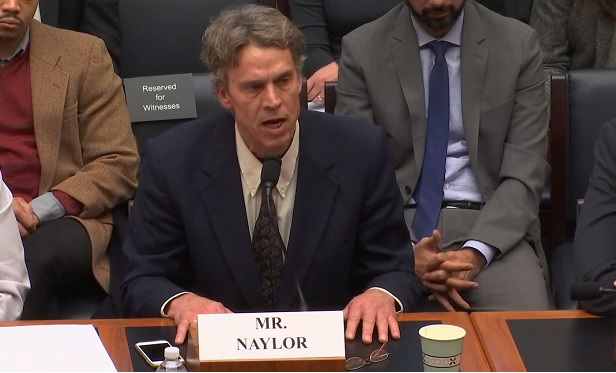 Bartlett Naylor (Credit: House Financial Services Committee)
Bartlett Naylor (Credit: House Financial Services Committee)
At least some members of the House Financial Services Committee say that fake public commenters have hurt the integrity of the public comment processes for new federal regulations — including the U.S. Department of Labor's fiduciary rule effort.
The House Financial Services oversight subcommittee held a hearing on public comment integrity in Washington, last week. The subcommittee gave the hearing the title, "Fake It Till They Make It: How Bad Actors Use Astroturfing to Manipulate Regulators, Disenfranchise Consumers and Subvert the Rulemaking Process."
Rep. Al Green, D-Texas, the subcommittee chairman, said "astroturfing" is "the practice of creating the false appearance of grassroots support for a particular policy or position where none exists, often to the benefit of shadowy, well-financed interests, and to the detriment of the general public."
Witnesses talked about the effects of fake comments on efforts to develop environmental regulations, banking regulations, and financial services sales standards.
Bartlett Naylor, a financial policy advocate at Public Citizen, gave a U.S. Department of Labor public comment period for the department's fiduciary rule effort as an example of what he sees as manipulation of the public comment process.
Naylor said a business group claimed to have located several dozen businesses that were afraid implementation of the Labor Department's fiduciary rule would lead to loss of their trusted financial advisors.
"I called them all," Naylor said. "Some of them were, in fact, Wall Street brokers themselves. Others didn't answer the phone."
One woman had said that her trusted advisor had helped her grow her business, but, in reality, Naylor said, the woman said she had added just one employee over the last decade.
"In other words," Naylor said, "these were pawns."
The GAO study
Investigators at the Government Accountability Office, a congressional research service, looked into public comment process integrity for the subcommittee.
Federal agencies propose about 3,700 regulations per year, and they have to give members of the public a chance to comment on most of those regulations, according to the GAO.
One concern, GAO officials say, is that different agencies have different rules for collecting and disclosing identifying information about the commenters.
"All selected agencies accepted anonymous comments," according to the GAO.
Agencies also have different rules for what to do when commenters submit the same, or very similar, comments, the GAO says.
Some agencies post each comment separately on the government's Regulations.gov system, but some simply post one example of a mass-submitted comment, the GAO says.
Possible solutions
Beth Simone Noveck, director of the Governance Lab at New York University, testified that agencies could improve the public comment process by taking steps such as:
- Using artificial intelligence systems or other means to mine vast piles of public comments for facts and ideas, and to reduce the impact of voluminous or duplicative comments.
- Creating mechanisms commenters can use to converse with one another and provide information and insights.
- Setting up a system similar to the United Kingdom's Evidence Check system, to crowdsource review of comments and evidence.
Resources
- Links to House Financial Services astroturfing hearing resources are available here.
- An article about financial professionals' efforts to comment on the Labor Department's fiduciary rule effort is available here and other commenters' suggestions here.
© 2025 ALM Global, LLC, All Rights Reserved. Request academic re-use from www.copyright.com. All other uses, submit a request to [email protected]. For more information visit Asset & Logo Licensing.







